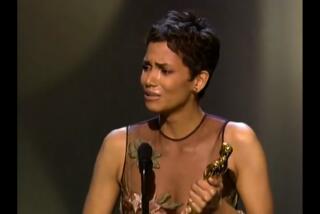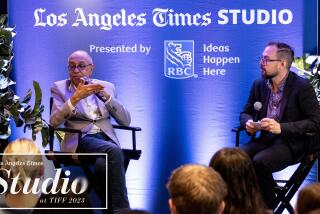Regrets, He’s Had a Few; Enough to Be Forgiven?
- Share via
In his memoir, film director Elia Kazan describes a chance encounter during the ‘50s with Zero Mostel, the talented (and then-blacklisted) actor-comedian, who Kazan remembered having helped to gain work. Kazan, who testified in 1952 as a “friendly witness” before the House Committee on Un-American Activities, had “named names” (though not Mostel’s) of those he had known during a brief mid-1930s period as a Communist Party member.
“[Zero] stopped me and put an arm around my neck . . . and said in one of the most dolorous voices I’ve ever heard, ‘Why did you do that? You shouldn’t have done that.’ ”
Almost a half-century later, Mostel’s question still resonates as the Academy of Motion Picture Arts & Sciences prepares to present a lifetime achievement award to Kazan at its Oscar ceremonies Sunday. Competing demonstrations at the event have already been announced. A small band of those blacklisted during the post-World War II Red scare years and their supporters have formed the “Committee Against Silence” to protest the award to Kazan by picketing outside and withholding applause inside, while another ad hoc group, the Committee for Naming Facts, plans its own demonstration in support of the award.
Probably few on either side of the great divide between “friendly” and “unfriendly” witnesses would challenge historian Arthur Schlesinger Jr.’s recent argument that, most likely, only those on the fringes would have raised objections to informing on Nazis or Mafia hoodlums or members of the Klan. “[Kazan’s] true offense in the minds of the Hollywood protesters is that he informed on the Communist Party,” Schlesinger said.
That may be true, but those in the industry named as Communists confronted years of blacklisting, political harassment and, in some instances, prison terms. Kazan’s critics claim that he has never really expressed regrets or apologized for the damage done by his testimony.
However, a reading of his eloquent 1988 memoir, “A Life,” proves otherwise. In it, there are numerous index citations to HUAC and to Kazan’s testimony, including a diary entry written the day after he appeared: “Miserably depressed. Can’t get my mind off it. I know I’ve done something wrong. Still convinced I would have done something worse if I’d done the opposite.” Then, months later, this: “My response [to criticism] was silence. . . . So I went my way, didn’t worry about lost friends and lived it out. Was there some guilt in my silence? Yes, at first, some. But there was also a growing belief in what I’d done. I could take it now and damn well did.”
Several decades after these diary entries, while writing his memoir, Kazan confessed to having these agonized, middle-of-the-night reflections: “I thought what a terrible thing I’d done; not the political aspect of it, because maybe that was correct; but it didn’t matter now, correct or not; all that mattered was the human side of the thing . . . I felt no political cause was worth hurting any other human for. What good deeds were stimulated by what I’d done? What villains exposed? How is the world better for what I did? It had just been a game of power and influence, and I’d been taken in and twisted from my true self.”
Can any serious reader of “A Life” doubt that, from that moment to the present, Kazan has wrestled inconclusively with the costs and consequences of his decision to name names to HUAC--and that he will continue to do so long after the presentation of this award? What more do those who plan to picket or not applaud wish? And do they demand similar accountability from those who, in an earlier day, served for a time the Stalinist “god that failed”? From neither side would formal apologies at this point seem useful.
That being said, I believe Kazan should consider using the occasion of the Oscars, or perhaps some later writing or interview, to answer Mostel’s question by sharing with this generation his current thoughts on the decision that he made, while struggling for artistic survival, to bear witness to his earlier Communist Party colleagues, none of whom were involved in espionage.
If I were at the Oscar ceremonies, I would applaud Kazan for his achievements as a motion picture director and, although disagreeing personally with his action in naming former party colleagues, would recognize the evident seriousness with which, over practically a half-century, he has confronted that agonizing moral choice.
More to Read
Only good movies
Get the Indie Focus newsletter, Mark Olsen's weekly guide to the world of cinema.
You may occasionally receive promotional content from the Los Angeles Times.









